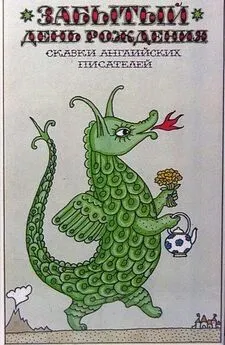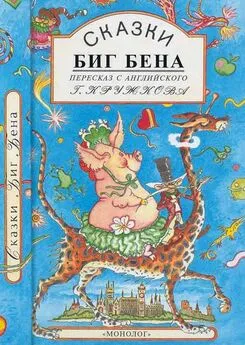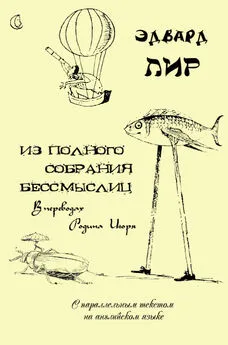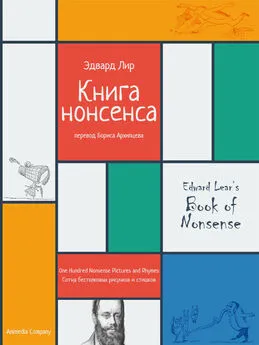Эдвард Лир - Книга бессмыслицы
- Название:Книга бессмыслицы
- Автор:
- Жанр:
- Издательство:неизвестно
- Год:неизвестен
- ISBN:нет данных
- Рейтинг:
- Избранное:Добавить в избранное
-
Отзывы:
-
Ваша оценка:
Эдвард Лир - Книга бессмыслицы краткое содержание
Эдвард Лир также Эдуард Лир (англ. Edward Lear, 1812–1888) — английский художник и поэт, один из основоположников «поэзии бессмыслицы» (nonsensical poetry), автор многочисленных популярных абсурдистских лимериков.
Книгу подготовила Юлия Стрекалова
Метод чтения Ильи Франка
Книга бессмыслицы - читать онлайн бесплатно полную версию (весь текст целиком)
Интервал:
Закладка:
But they gave his some butter (дали ему немного масла; give — давать ),
Which caused him to mutter (заставило его бормотать, ворчать),
And cured that Old Person of Prague (вылечило).
There was an Old Person of Prague,
Who was suddenly seized with the Plague;
But they gave his some butter,
Which caused him to mutter,
And cured that Old Person of Prague.
There was an Old Man of the North (с Севера),
Who fell into a basin of broth (упал в миску с мясным бульоном);
But a laudable cook (достойная похвалы кухарка),
Fished him out with a hook (выудила его на крюком),
Which saved (что спасло) that Old Man of the North.
There was an Old Man of the North,
Who fell into a basin of broth;
But a laudable cook,
Fished him out with a hook,
Which saved that Old Man of the North.
There was a Young Lady of Poole,
Whose soup was excessively cool (чей суп был чрезмерно холодным);
So she put it to boil (поставила его кипятиться, вскипятила; put— класть, ставить )
By the aid of some oil (при помощи /растительного/ масла),
That ingenious Young Lady of Poole (изобретательная).
There was a Young Lady of Poole,
Whose soup was excessively cool;
So she put it to boil
By the aid of some oil,
That ingenious Young Lady of Poole.
There was an Old Person of Mold,
Who shrank from sensations of cold (который не переносил ощущений холода; shrink — садиться, съеживаться; избегать ),
So he purchased some muffs (приобрел несколько муфт),
Some furs and some fluffs (немного меха и немного пуха),
And wrapped himself (укутал себя) from the cold.
There was an Old Person of Mold,
Who shrank from sensations of cold,
So he purchased some muffs,
Some furs and some fluffs,
And wrapped himself from the cold.
There was an Old Man of Nepaul,
From his horse had a terrible fall (со своей лошади имел ужасное падение);
But, though split quite in two (хотя распался практически на две /половины/),
By some very strong glue (при помощи некоторого очень сильного клея),
They mended that Man of Nepaul (починили).
There was an Old Man of Nepaul,
From his horse had a terrible fall;
But, though split quite in two,
By some very strong glue,
They mended that Man of Nepaul.
There was an Old Man of th' Abruzzi,
So blind that he couldn't his foot see (такой слепой, что не мог своей ноги видеть);
When they said, 'That's your toe (палец ноги),
He replied, 'Is it so? (так ли это)
That doubtful Old Man of th' Abruzzi (сомневающийся).
There was an Old Man of th' Abruzzi,
So blind that he couldn't his foot see;
When they said, 'That's your toe,
He replied, 'Is it so?
That doubtful Old Man of th' Abruzzi.
There was an Old Person of Rhodes (с /острова/ Родос),
Who strongly objected to toads (сильно, весьма возражал /против/ жаб);
He paid several cousins (заплатил нескольким кузинам; pay — платить ),
To catch them by the dozens (ловить их = чтобы ловили их дюжинами),
That futile Old Person of Rhodes (несерьезный, пустой).
There was an Old Person of Rhodes,
Who strongly objected to toads;
He paid several cousins,
To catch them by the dozens,
That futile Old Person of Rhodes.
There was an Old Man of Peru,
Who watched his wife making a stew (смотрел за его женой, готовящей тушеное мясо);
But once by mistake (однажды по ошибке),
In a stove she did bake (в печи они испекла),
That unfortunate Man of Peru (несчастного).
There was an Old Man of Peru,
Who watched his wife making a stew;
But once by mistake,
In a stove she did bake,
That unfortunate Man of Peru.
There was an Old Man of Melrose,
Who walked on the tips of his toes (ходил на цыпочках);
But they said, 'It ain't pleasant (это не приятно),
To see you at present (видеть Вас сейчас, в настоящее время),
You stupid Old Man of Melrose (глупый).
There was an Old Man of Melrose,
Who walked on the tips of his toes;
But they said, 'It ain't pleasant,
To see you at present,
You stupid Old Man of Melrose.
There was a Young Lady of Lucca ([город в Италии]),
Whose lovers completely forsook her (возлюбленные совершенно покинули ее; farsake — покидать, бросать, отвергать );
She ran up a tree (взабралась на дерево),
And said, 'Fiddle-de-dee! (Ерунда! Вздор!)
Which embarassed (что смутило) the people of Lucca.
There was a Young Lady of Lucca,
Whose lovers completely forsook her;
She ran up a tree,
And said, 'Fiddle-de-dee!
Which embarassed the people of Lucca.
There was an Old Man of Bohemia (из Богемии = из Чехии),
Whose daughter was christened (дочь нарекли) Euphemia (‘добрая слава’ — греч. ),
Till one day, to his grief (пока в один день, к его горю),
She married a thief (она вышла замуж за вора),
Which grieved (что огорчило) that Old Man of Bohemia.
There was an Old Man of Bohemia,
Whose daughter was christened Euphemia,
Till one day, to his grief,
She married a thief,
Which grieved that Old Man of Bohemia.
There was an Old Man of Vesuvius,
Who studied the works of Vitruvius (изучал работы Виртувия /по архитектуре/);
When the flames burnt his book (когда языки пламени сожгли его книгу; burn — жечь, обжигать ),
To drinking he took (пить он начал, запил),
That morbid Old Man of Vesuvius (болезненный, нездоровый, с отклонениями).
There was an Old Man of Vesuvius,
Who studied the works of Vitruvius;
When the flames burnt his book,
To drinking he took,
That morbid Old Man of Vesuvius.
There was an Old Man of Cape Horn (с Мыса Доброй Надежды),
Who wished he had never been born (желал, чтобы он никогда не был рожден);
So he sat on a chair (потому он сидел на стуле),
Till he died of despair (пока не умер от отчаяния),
That dolorous Man of Cape Horn (страдающий, унылый).
There was an Old Man of Cape Horn,
Who wished he had never been born;
So he sat on a chair,
Till he died of despair,
That dolorous Man of Cape Horn.
There was an Old Lady whose folly (чье сумасшествие, чья глупость),
Induced her to sit on a holly (побудила ее сидеть на остролисте);
Whereon by a thorn (на котором шипом),
Her dress being torn (ее платье было разорвано; tear— рвать ),
She quickly became melancholy (она быстро стала подавленной; become — становиться ).
There was an Old Lady whose folly,
Induced her to sit on a holly;
Whereon by a thorn,
Her dress being torn,
She quickly became melancholy.
There was an Old Man of Corfu,
Who never knew what he should do (никогда не знал, что ему следует делать);
So he rushed up and down (носился туда — сюда: «вверх и вниз»),
Till the sun made him brown (пока солнце не сделало его коричневым),
That bewildered Old Man of Corfu (сбитый с толку, озадаченный).
There was an Old Man of Corfu,
Who never knew what he should do;
So he rushed up and down,
Till the sun made him brown,
That bewildered Old Man of Corfu.
There was an Old Man of the South (с Юга),
Who had an immoderate mouth (чрезмерный рот);
But in swallowing a dish (глотая блюдо),
That was quite full of fish (которое было довольно полным рыбы),
He was choked (подавился), that Old Man of the South.
There was an Old Man of the South,
Who had an immoderate mouth;
But in swallowing a dish,
That was quite full of fish,
He was choked, that Old Man of the South.
There was an Old Man of the Nile (с Нила),
Who sharpened his nails with a file (затачивал ногти напильником),
Till he cut out his thumbs (пока не отрезал большие пальцы своих рук),
And said calmly (спокойно), 'This comes (это происходит = приходит)
Читать дальшеИнтервал:
Закладка:





